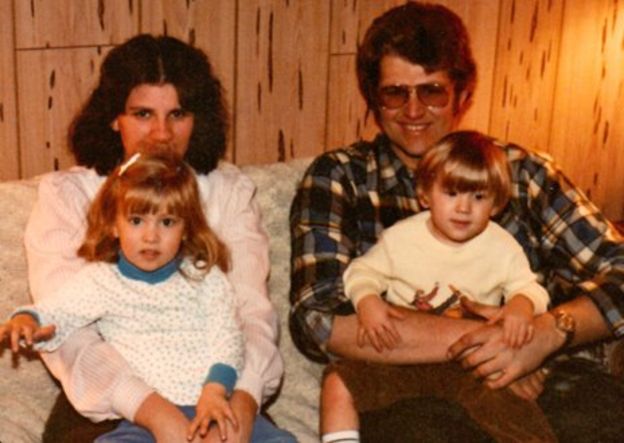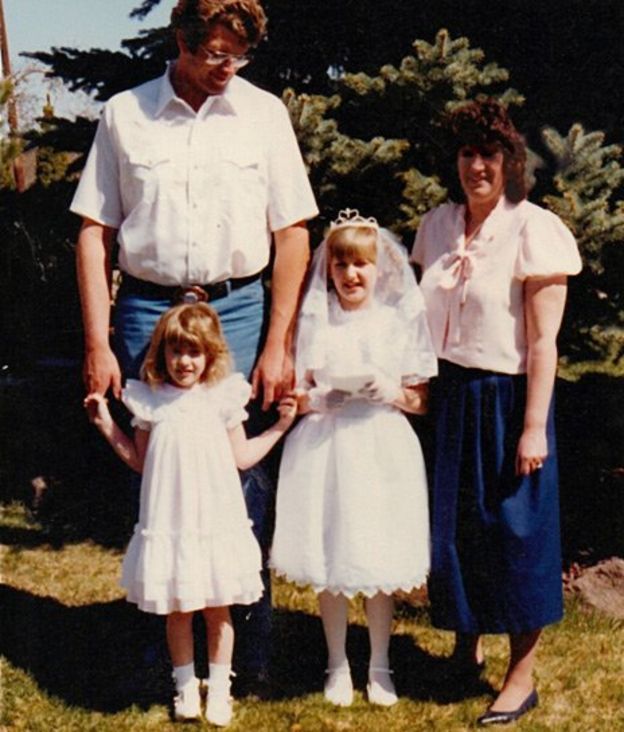This article originally appeared on VICE Australia.
This story a small extract from our podcast, Extremes. For a more intimate, detailed version of the story, you can listen to the full show right here, for free, and exclusive to Spotify.
Trigger warning: this story contains descriptions of violence
I’ll never forget the day I found out. It was March 1995; I'd come home from school and my mom called out for me and my siblings. Then she said, “Your father's in jail.” My brother asked, “For what?” And she said, “For murder.”
Nothing prepares you for that type of news. I remember my knees feeling weak, like I was going to collapse. So, I went into my room, lay down on the bed and sobbed while my head raced, trying to make sense of it. Did he kill another man? Accidentally? In a fight? I tried to imagine that happening, but it didn’t feel like something he’d do. Also he didn’t have any guns, so I couldn’t imagine him shooting somebody. But then I pictured him strangling, and somehow that was easy. For some reason I could clearly visualize him strangling a woman.
Honestly, there wasn’t a lot of information—my mom wasn’t giving us information. She told us later that it was to protect us. So I went to the library to try to find out anything I could. And what I learned was that it wasn’t for just one murder, it was actually for the murder of eight women.
My world changed after that. I had to reexamine all my memories to make sense of the past, and that was hard. But not as hard as starting again. Not as hard as the process of healing, accepting, and rebuilding.

I was born in Yakima, Washington. It’s a dusty rural place, but I had a lot of room to grow and a great childhood. I’m the eldest of three children, and my father was a really incredible man. He was 6 foot 6 and about 250-300 pounds—he towered over everybody. I thought he was almost god-like. He would walk into a room and you couldn’t help but notice his presence.
There were two sides to my father, one very much opposing the other. On the surface he was a bubbly, charismatic man, but then there was something underneath that. There was just something "off" about him.
For example, one day my father was working on the field. He didn’t notice that my brother had found this black adult stray cat, and was petting it. I noticed the cat because of the fur, it was glistening. We were young, I must have been six and my brother five. And then all of a sudden we felt the sun eclipse as Dad’s shadow came over us. He said, “What do you have there?”
I could see my brother shielding the cat, trying to protect it. By my dad grabbed the cat and put it cat on his lap and started petting it. Then all of a sudden, he took his huge hands and started to strangle it. The cat’s reaction was to fight for its life, and it started to claw him, but my dad was absolutely enjoying himself. I remember the smile on his face. And I could see blood coming off of my dad’s forearms, but that didn’t seem to faze him. He just continued, until all of a sudden the cat went limp.
For the full story, you can listen to the podcast by simply clicking "play" on the media player:
Life was mostly idyllic for me. I was going to elementary school and had a normal routine. So, to my surprise, just after my birthday one summer my mom announced that we were leaving. I just remember getting into the car with my mom, who said, “You know, your dad doesn’t want us anymore. So we're getting a divorce, and we're going to your grandma’s house.”
It was 1990 when my parents officially divorced, and as I learned later, things took a turn for the worse. He was unemployed, and one night he went to a billiards place and was playing pool when he saw this 23-year-old woman named Taunja Bennett. They started playing pool together and he invited her back to the house. From there, she started to reject his advances. He then unleashed his rage and, from what I’ve heard, he just completely smashed her face—brutalized her—to the point where detectives found teeth in different locations around the house. Then, once he'd gotten that taste of blood, he couldn’t be stopped.
My mom didn’t know any of this. But in hindsight, it’s a silver lining we stayed away from him.
My father was arrested in 1995 for the murder of his last victim. This was 41-year-old Julie Winningham, who was his long-term girlfriend after my mother. I never went to his trial. Honestly, we were shielded. We didn’t have to witness or participate in any of the trial proceedings. And I figured once he started confessing to all the other murders that he wasn’t going anywhere. He was going to stay in jail for the rest of his life.
All of this absolutely changed how I saw myself. From then on, I watched people’s reactions when they heard the news about my father. When I went to high school after his arrest, I had friends whose parents watched the news and told their children to stay away from me. I felt guilty by association. I felt that something must be wrong with me. It was confusing. It definitely changed how I saw myself as a person, until later in my adult years.

Years later, I had children of my own. I never talked about what had happened until one day when my daughter, Aspen, came home from kindergarten. She said, “Everybody has a dad, but where’s your dad?” And I had to figure out a way to explain. I just told her that he was in Salem, which was the location of the prison. And she was little and she was okay with that answer. But then it got me thinking: I had to figure out a way to tell her as she got older.
That was the turning point. From there, I realized that it was nothing that I did. There was nothing I could do to bring those poor women back and there was nothing I could say to the victims' families to soften the blow of losing their loved ones. So I had a choice. I could either accept the past or I could continue living like I was the scum of the earth—and that was no way to live.
What I’ve learned through a lot of self-work is there’s actually a science to healing. I know trauma survivors all feel the same way, which is that, if we face the pain, we’ll go into this dark abyss and never get out. But honestly, therapy is wonderful and nothing to be scared of. You won’t fall into a hole and never get out. If you actually face the trauma, you’ll become much more self-aware and come to understand what causes the pain.
I have teenagers now and a really busy life, so my mind rarely goes to the past. I’m happy now. The only thought that has been creeping up in my mind lately is about visiting my dad in prison. It’s been decades since we spoke, and if I reach out to him, does that mean he won? Does that mean he got his way? I don’t know.
My father never apologized. He said that he was a good father except for his “eight errors in judgment”. That’s what he called the murders—“errors in judgment”.
I don’t feel that there will ever be closure for the victims’ families, and I don’t think justice is ever fully achieved. The only thing I can be thankful for is that he is in a place where he can’t ever hurt anybody again.
This story a small extract from our podcast, Extremes. Listen to the full show right here, for free, and exclusively to Spotify.
Follow Melissa Moore on Instagram and Facebook
from VICE https://ift.tt/3cujTJM
via cheap web hosting
No comments:
Post a Comment